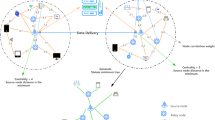Abstract
Delay tolerant networks can not maintain end-to-end connectivity. Thus the routing is one of the critical issues. As we known, the two-level community model including the small community and the big community is proposed for the first time. In the same small community, any two member nodes are friends with each other. And in the same big community which is constructed of some small communities, any two communities have some pairs of friend nodes between them. Based on this model, a two-level community-based routing (TLCR) algorithm is presented in delay tolerant networks. In TLCR, according to the location of packet holder including inside the small community of destination node, inside of the big community and outside of the small community of destination node, and outside of the big community of destination node, the different packet forwarding strategies are investigated. The number of relay nodes selected by a packet holder is decreasing with the holder’s location from inside of the small community of destination node to outside of the big community of destination node. The probability of the source node successfully delivers the packet to the destination node and the copies number corresponding with the above three locations are analyzed, respectively. The simulation results show that TLCR not only improves the delivery ratio but also greatly reduces the resource cost.








Similar content being viewed by others
References
Fall, K. (2003). A delay-tolerant network architecture for challenged internets. In The conference on applications, technologies, architectures, and protocols for computer communication (pp. 27–34). ACM, New York
Liu, J., Wang, Q. S., Wang, Q., Shen, J., & Wang, J. M. (2015). An information search algorithm based on query delegation and feedback delegation in delay-tolerant networks. Wireless Personal Communications. doi:10.1007/s11277-015-2369-3.
Lindgren, A., Doria, A., & Schelén, O. (2003). Probabilistic routing in intermittently connected networks. SIGMOBILE Mobile Computing and Communications Review, 7(3), 19–20.
Burns, B., Brock, O., & Levine, B. N. (2005). MV routing and capacity building in disruption tolerant networks. In IEEE INFOCOM (pp. 398–408).
Vahdat, A., & Becker, D. (2000). Epidemic routing for partially connected ad hoc networks. Duke University, Technical Report CS-200006 (pp. 19–23).
Spyropoulos, T., Psounis, K., & Raghavendra, C. S. (2005). Spray and wait: an efficient routing scheme for intermittently connected mobile networks. In ACM SIGCOMM workshop on delay-tolerant networking (pp. 252–259).
Spyropoulos, T., Psounis, K., & Raghavendra, C. S. (2007). Spray and focus: efficient mobility-assisted routing for heterogeneous and correlated mobility. In Proceedings of the fifth annual IEEE international conference on pervasive computing and communications (pp. 79–85).
Dang, F., Yang, X., & Long, K. P. (2012). Spray and forward: Efficient routing based on the markov location prediction model for DTNs. Science China Information Sciences, 55(2), 433–440.
Hui, P., & Crowcroft, J. (2007). How small labels create big improvements. In IEEE international conference on pervasive computing and communications workshops, fifth annual (pp. 65–70).
Hui, P., Crowcroft, J., & Yonek, E. (2008). Bubble rap: social-based forwarding in delay tolerant networks. In Proceedings of the nineth ACM international symposium on mobile ad hoc networking and computing (pp. 241–250).
Bulut, E., & Szymanski B. K. (2010). Friendship based routing in delay tolerant mobile social networks. In IEEE global telecommunications conference (pp. 1–5).
Zhu, Y., Xu, B., Shi, X., & Wang, Y. (2013). A survey of social-based routing in delay tolerant networks: Positive and negative social effects[J]. Communications Surveys & Tutorials, 15(1), 387–401.
Gao, W., Li, Q., Zhao, B., & Cao, G. (2009). Multicasting in delay tolerant networks: A social network perspective networks. In Proceedings of the tenth ACM international symposium on mobile ad hoc networking and computing (pp. 299–308).
Daly, E. M., & Haahr, M. (2007). Social network analysis for routing in disconnected delay-tolerant manets. In Proceedings of the eighth ACM international symposium on Mobile ad hoc networking and computing (pp. 32–40).
Chen, K., & Shen, H. (2014). DSearching: distributed searching of mobile nodes in DTNs with floating mobility information. In IEEE INFOCOM (pp. 2283–2291).
Wang, Q. S., & Wang, Q. (2014). Restricted epidemic routing in multi-community delay tolerant networks. IEEE Transactions on Mobile Computing. doi:10.1109/TMC.2014.2364846.
Abdelkader, T., & Naik, K. (2013). SGBR: A routing protocol for delay tolerant networks using social grouping. IEEE Transactions on Parallel and Distributed Systems, 24(12), 2472–2481.
Erramilli, V., Chaintreau, A., Crovella, M., & Christophe, D. (2007). Diversity of forwarding paths in pocket switched networks. In Proceedings of the seventh ACM SIGCOMM conference on internet measurement (IMC) (pp. 161–174).
Scott, J., Gass, R., Crowcroft, J., Hui, P., Diot, C., & Chaintreau, A. (2009). CRAWDAD packet set cambridge/haggle. (v. 2009-05-29).
Acknowledgements
The authors would like to thank the anonymous reviewers for their insightful comments which have helped improve the quality of this paper. This work was partly supported by Natural Science Foundation of China [61401144, 61571179], Open Fund of State Key Lab. For Novel Software Technology, Nanjing University, China [KFKT2014B22], and the Fundamental Research Funds for the Central Universities [2015HGZX0019].
Author information
Authors and Affiliations
Corresponding author
Rights and permissions
About this article
Cite this article
Xia, M., Wang, Q., Wang, Q. et al. Two-Level Community-Based Routing in Delay Tolerant Networks. Wireless Pers Commun 96, 5687–5704 (2017). https://doi.org/10.1007/s11277-017-4442-6
Published:
Issue Date:
DOI: https://doi.org/10.1007/s11277-017-4442-6




